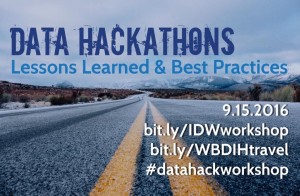The West Big Data Innovation Hub (WBDIH) is excited to host a Data Hackathons: Lessons Learned and Best Practices Workshop on September 15 as part of the historic first International Data Week in Denver.
One of four hubs recently launched with funding from the National Science Foundation and leadership from UC Berkeley, University of Washington, and the San Diego Supercomputer Center, the WBDIH builds and strengthens partnerships across industry, academia, nonprofits, and government to address societal challenges.
As mentioned at the WBDIH All Hands Meeting held at UC Berkeley this spring, the workshop will convene hackathon organizers, sponsors, and other stakeholders to share insights about the design, implementation, scalability, and impact of data-focused hackathons. Data hackathon case studies mentioned will cover the WBDIH thematic areas including Metro Data Science, Natural Resources and Hazards, and Precision Medicine, as well as cross-cutting topics.
Funding for Early Career Data Scientists
The September workshop is the second WBDIH hands-on event offering grants for early career data scientists through a collaboration with the Computing Community Consortium (CCC). In June 2016, over 700 data enthusiasts from 25 states and 15 countries gathered in Los Angeles and via livestream for a workshop on The Science of Data-Driven Storytelling. To encourage early career researchers to participate and contribute to the #datascistories and #datahackworkshop communities, the WBDIH has partnered with the CCC to provide funding. Grant Applications for the Data Hackathons Workshop are due Sept. 6, 2016: http://bit.ly/WBDIHtravel.
Remote Participation and Community-Driven Resources
Remote participants are encouraged to join the conversation are share resources at WBDIH.slack.com and datahackworkshop. More information, including the livestream from 2–5pm MST Sept. 15, will be posted at http://westbigdatahub.org/datahackworkshop and through the WBDIH mailing list.
Share the announcement on Twitter | Retweet the U.S. Chief Data Scientist’s Tweet | Share via Facebook
Quelle: Amplab Berkeley

Published by